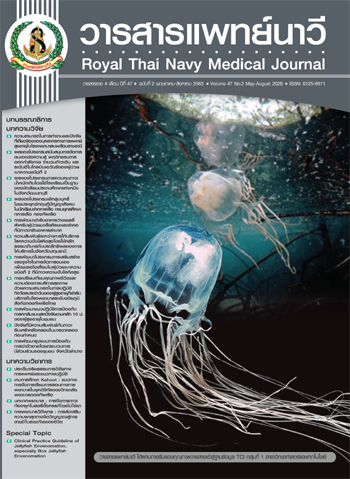Kahoot Educational Game : Nursing Education Management Guidelines in the Digital age of the Royal Thai Navy College of Nursing
Main Article Content
Abstract
Kahoot is an interactive quizzing online game that fits well with characteristics of learners in the digital age and supports the development of 21st century learning skills. Many digital-age educators have recently used Kahoot as educational media to support student’s learning and formative evaluation. This article presents teaching and learning techniques through game-based learning. It specifically focuses on Kahoot educational
game and the application of Kahoot in nursing and medical education. Examples of Kahoot-based teaching and learning at the Royal Thai Navy College of Nursing are provided.
Article Details

This work is licensed under a Creative Commons Attribution-NonCommercial-NoDerivatives 4.0 International License.
References
Janpirom N, Kunlaya S, Roungrong P, Kaewurai R. Educational technology within Thailand 4.0. Panyapiwat Journal 2019;11(1):304-14. (in Thai).
Gerdruang A. Empowering learning in the 21st century for Thailand society in the digital age. Lampang Rajabhat University Journal 2017;6(1):173-84. (in Thai).
Jongmuenwai B, Kongsrima K, Prachai S, Jabjone S, Suikraduang A. Gamification for learning. Journal of Project in Computer Science and Information Technology 2018;4(2):34-43. (in Thai).
Chanintarapum A. The study guidelines for learning theory to constructivism using educational games. Journal of Education, Silpakorn University 2016;14(1):54-9. (in Thai).
Poondej C, Lerdpornkulrat T. Learning management with the gamification concept. Journal of Education Naresuan University 2016;18(3):331-9. (in Thai).
Goksun DO, Gursoy G. Comparing success and engagement in gamified learning experiences via kahoot and quizizz. Comput Edu 2019;135:15-29.
Kinder FD, Kurz JM. Gaming strategies in nursing education. Teach Learn Nurs 2018;13(4):212-4.
Stanley D, Latimer K. The ward: a simulation game for nursing student. Nurse Educ Pract 2011;11(1):20-5.
Jones SM, Katyal P, Xie X, Nicolas MP, Leung EM, Noland DM, et al. A kahoot approach: the effectiveness of game-based learning for an advanced placement biology class. Simul Gaming 2019;50(6):832-47.
Plump CM, LaRosa J. Using kahoot in the classroom to create engagement and active learning: a game-based technology solution for e-learning novices. Management Teaching Review 2017;2(2):151-8.
Licorish SA, Owen HE, Daniel B, George JL. Students’ perception of kahoot’s influence on teaching and learning. Res Pract Technol Enhanc Learn 2018;13(9):1-23.
Pechjaroen R, Charoensin W. Evaluation of using kahoot program in instruction via telemedicine distance learning network. Journal of Faculty of Education Pibulsongkram Rajabhat University 2018;5(2):162-75. (in Thai).
Lertwittayakul T. Formative evaluation of learning by game based. College of Asian Scholars Journal 2017;7(Special Issue):104-16. (in Thai).
Nakasan N, Nakasan C. Game: innovation for creative education. Romphruek Journal 2016;34(3):159-82. (in Thai).
Khemmani T. Science of teaching: knowledge for effective learning process. 16th ed. Bangkok: Chulalongkorn University Printing House; 2012. (in Thai).
Blakely G, Skirton H, Cooper S, Allum P, Nelmes P. Educational gaming in the health sciences: systematic review. J Adv Nurs 2008;65(2):259-69.
Spence B. The effects of interactive quizzing with kahoot on student learning and satisfaction: a pilot study. Radiologic Science & Education 2019;24(2):21-8.
Ismail MAA, Ahmad A, Mohammad JAM, Fakri NMRM, Nor MZM, Pa MNN. Using kahoot as a formative assessment tool in medical education: a phenomenological study. BMC Med Educ 2019;19(1):230.
Viphatphumiprathes T. The academic achievement of ASEAN studies of undergraduate student by kahoot game-based learning. Rangsit University Library Journal 2019;25(2):50-63. (in Thai).
Kaewsalubsri S. An creating smart classroom by kahoot program. [Internet]. [cited 2020 July 12]. Available from: http://teachingresources.psu.ac.th/files/meded_focus/
/6june_2016.pdf.


